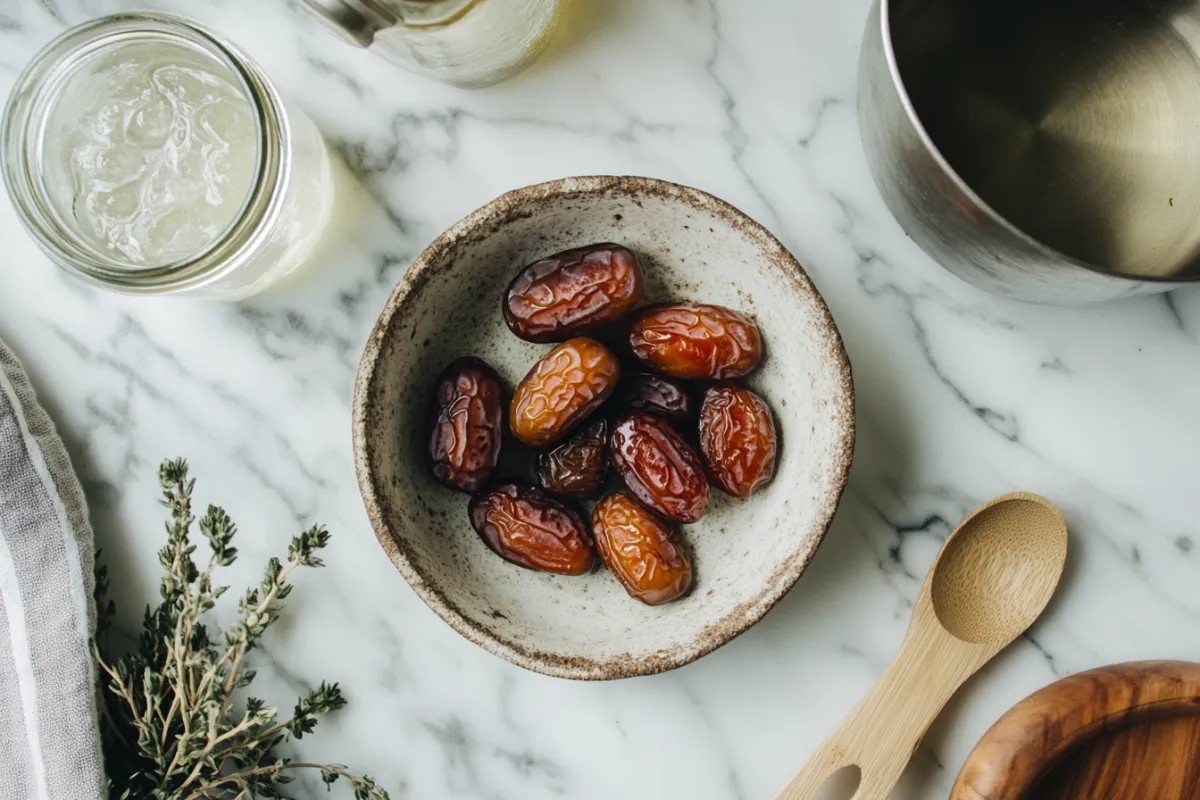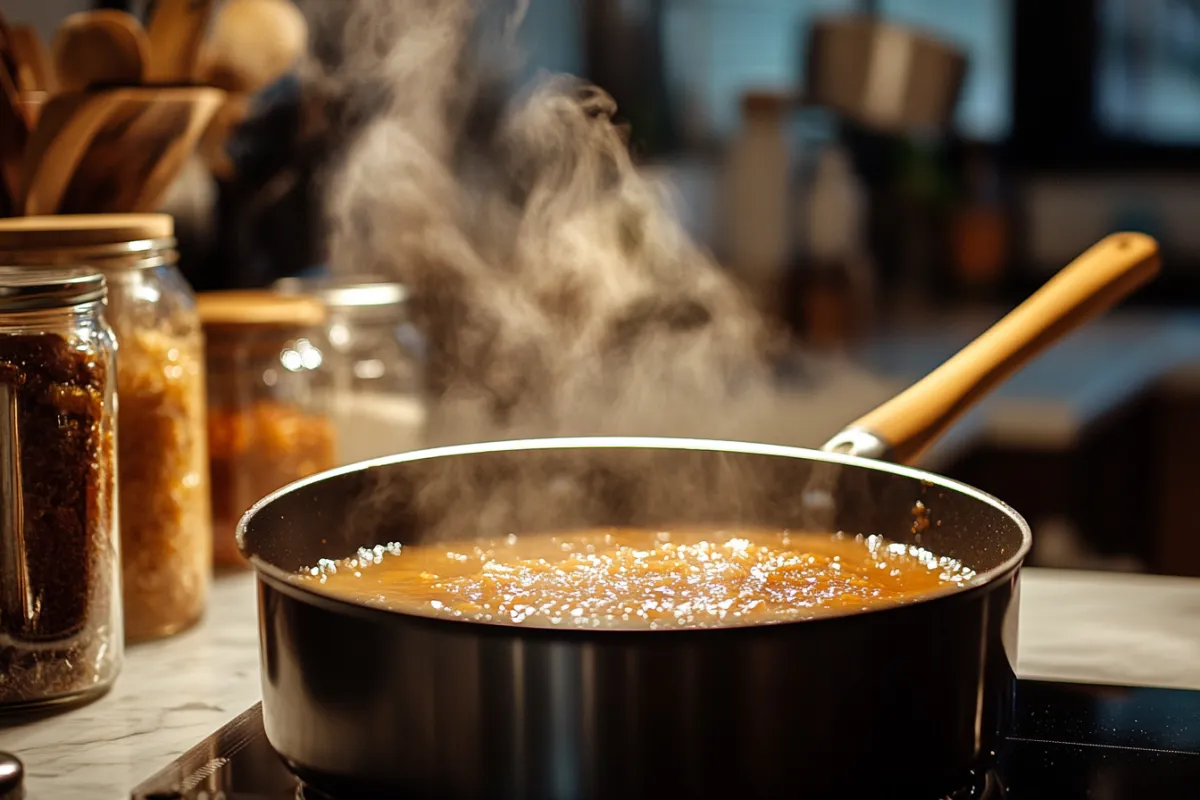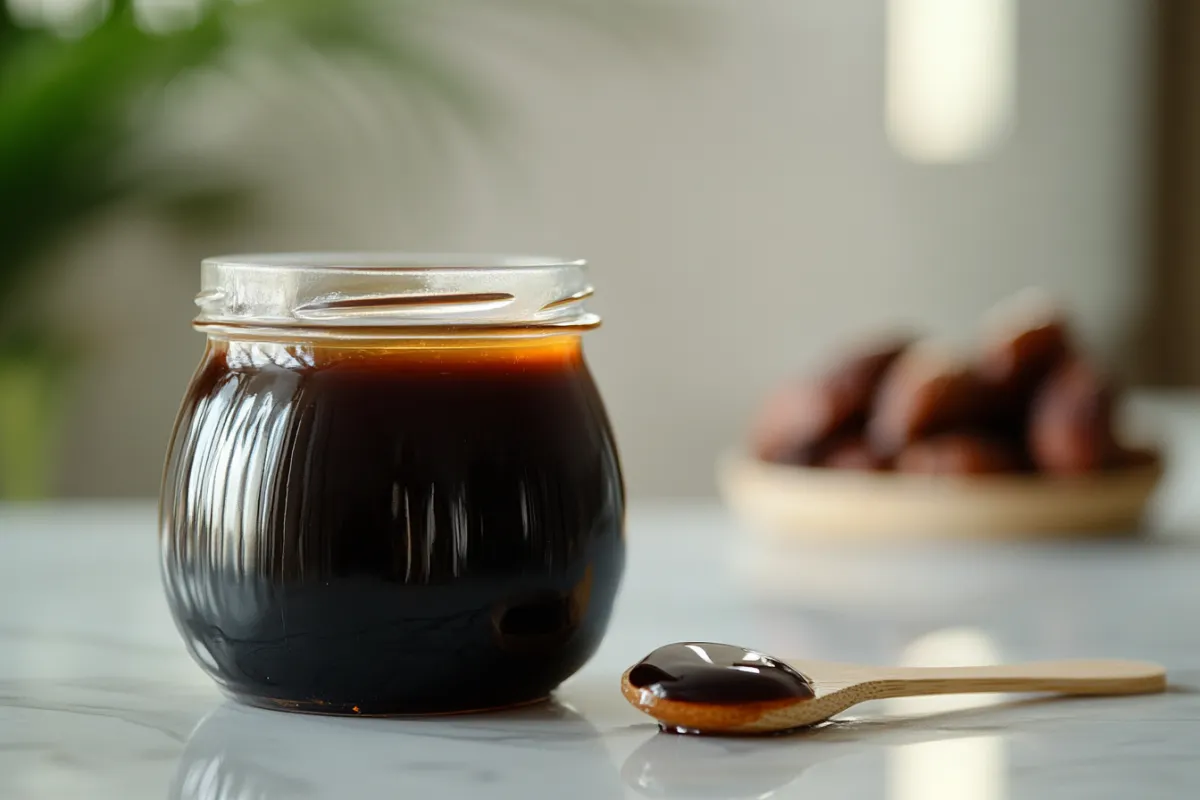Date syrup, a rich and flavorful sweetener, is quickly gaining popularity around the world. With its roots deeply planted in Middle Eastern cuisine, this natural syrup has been used for centuries. Today, it is celebrated for its unique taste and nutritional benefits, making it an appealing alternative to refined sugar and artificial sweeteners. But what makes this syrup stand out from the rest? In this article, we’ll explore everything you need to know about this natural sweetener, from its history to its nutritional benefits, and how you can incorporate it into your cooking.
What is Date Syrup?
Date syrup is a natural sweetener derived from dates, the fruit of the date palm tree (Phoenix dactylifera). Unlike processed sugars or even other natural sweeteners like honey, date syrup is made solely from dates, preserving much of the fruit’s original nutritional value.
Characteristics of Date Syrup
- Consistency: Date syrup has a thick, molasses-like consistency, which can resemble caramel in texture.
- Flavor: Its flavor is rich, deep, and slightly smoky, with hints of caramel and a molasses finish, making it distinct from other sweeteners like honey or maple syrup.
- Natural Origins: Unlike refined sugars, date syrup contains the natural fiber, vitamins, and minerals present in dates, making it a much healthier option.
The History of Date Syrup
Date syrup’s origins can be traced back thousands of years to ancient Mesopotamia. Early civilizations in the Middle East have long prized this syrup for its taste, versatility, and health benefits.
Cultural Significance
In Middle Eastern cultures, date syrup has been a staple ingredient for centuries, used in both savory and sweet dishes. It holds cultural importance, often being served during religious holidays and special occasions, such as Ramadan and Eid, as a symbol of hospitality and abundance.
Modern Popularity
In recent years, date syrup has crossed into Western markets, with health-conscious individuals seeking out natural alternatives to processed sweeteners. This growing demand has led to a surge in its availability at health food stores and online retailers. Today, it is a key ingredient in many plant-based diets, as well as in the kitchens of food enthusiasts looking for something new.
How is Date Syrup Made?
The process of making date syrup is simple and retains much of the fruit’s nutritional content. Here’s how it’s done:

Step-by-Step Process
- Soaking the Dates: Dates are soaked in water to soften them, making it easier to extract the natural sugars and nutrients.
- Simmering the Mixture: The softened dates are simmered in water until they break down into a thick, syrupy consistency.
- Straining the Syrup: The mixture is strained to remove solids, leaving behind a rich, thick syrup.
- Reducing the Syrup: The strained liquid is simmered again until it reaches the desired consistency. Homemade date syrup is often thicker than commercial varieties.
- Nutritional Retention: Unlike processed sweeteners, the syrup retains much of its original nutritional profile, including important vitamins and minerals like potassium, magnesium, and iron.
Nutritional Benefits of Date Syrup
Date syrup isn’t just about flavor – it’s also packed with nutrients that make it a healthier alternative to other sweeteners.
Key Nutrients in Date Syrup
- Rich in Potassium: Dates are naturally high in potassium, which helps to regulate blood pressure and support heart health.
- High in Magnesium: Magnesium is essential for muscle function and energy levels. Date syrup is a good source of this vital mineral.
- Contains Iron: Iron is critical for the production of red blood cells. Date syrup provides a plant-based source of iron, making it beneficial for those with iron deficiencies or those following a plant-based diet.
- Antioxidants: Dates contain powerful antioxidants, which help to fight inflammation and promote overall health.
- Low Glycemic Index: With a glycemic index (GI) of around 47, date syrup releases sugar more slowly into the bloodstream than many other sweeteners. This makes it a safer option for people with diabetes.
Health Benefits
Thanks to its nutrient-dense profile, consuming date syrup can offer the following benefits:
- Supports Heart Health: The potassium and magnesium in date syrup help lower blood pressure and improve cardiovascular health.
- Boosts Energy Levels: Date syrup’s natural sugars and magnesium content provide a quick energy boost, making it ideal for athletes and those needing sustained energy throughout the day.
- Promotes Digestive Health: The fiber found in date syrup can aid in digestion, preventing constipation and promoting regular bowel movements.
- Improves Bone Health: Magnesium and calcium found in date syrup help in maintaining strong bones and teeth.
Date Syrup vs Other Sweeteners
When choosing a natural sweetener, it’s important to understand how date syrup compares to popular alternatives.
Date Syrup vs Honey
- Nutritional Comparison: Both honey and date syrup are rich in antioxidants, but date syrup contains more fiber and minerals like potassium and magnesium.
- Diabetes-Friendly: With a lower glycemic index than honey, date syrup is a better option for those monitoring their blood sugar levels.
- Dietary Preferences: For vegans, date syrup is a preferred choice over honey, which is produced by bees.
Maple Syrup vs Date Syrup
- Taste Differences: Maple syrup has a lighter, more delicate flavor, while date syrup offers a more robust, caramel-like taste.
- Usage in Cooking: Both can be used interchangeably in recipes, but the strong flavor of date syrup is better suited for hearty, rich dishes like roasted meats or dense desserts.
Date Syrup vs Agave and Other Sweeteners
- Health Advantages: Agave syrup is often marketed as a healthy alternative, but it lacks the fiber, vitamins, and minerals found in date syrup.
- Lower Glycemic Index: Date syrup has a lower GI than agave, making it a better choice for maintaining stable blood sugar levels.
How to Use Date Syrup in Cooking and Baking
Date syrup’s versatility makes it an excellent addition to a wide variety of dishes. Here are some popular ways to incorporate it into your cooking:
Sweet Applications
- Drizzle on Pancakes: Use date syrup instead of maple syrup for a deeper, more complex flavor.
- Smoothies and Drinks: Add a spoonful to your morning smoothie or coffee for a natural energy boost.
Savory Applications
- Salad Dressings: Mix date syrup with olive oil and vinegar for a sweet and tangy salad dressing.
- Glaze for Meats: Brush date syrup onto roasted meats like chicken or pork for a caramelized finish.
Baking Substitute
Replace sugar or honey with date syrup in baked goods for natural sweetness. However, remember to adjust the moisture content in recipes, as date syrup is more liquid than sugar.
Tips for Substituting Date Syrup
When substituting date syrup for other sweeteners in recipes:

- Reduce the liquid: Cut the liquid in the recipe by about 1/4 cup for every cup of date syrup used.
- Adjust sweetness: Date syrup is less sweet than sugar, so you may need to use slightly more depending on the recipe.
Date Syrup and Dietary Preferences
One of the great things about date syrup is its adaptability to a wide range of diets:
- Vegan-Friendly: Unlike honey, date syrup is entirely plant-based, making it suitable for vegans.
- Gluten-Free and Paleo: Date syrup fits easily into both gluten-free and Paleo diets, offering a natural source of sweetness without grains or processed sugars.
- Raw Food Diet: Some date syrups are raw, meaning they haven’t been exposed to high heat, making them an option for raw food enthusiasts.
Health Considerations and Drawbacks
Although date syrup is a healthier alternative to processed sugar, it should still be consumed in moderation.
Impact on Blood Sugar
While date syrup has a lower glycemic index than many sweeteners, it can still raise blood sugar levels. Individuals with diabetes should monitor their intake carefully.
Overconsumption of Sugars
Even though it’s natural, consuming too much date syrup can contribute to excessive sugar intake, leading to potential health issues like weight gain and increased risk of heart disease.
How to Make Date Syrup at Home
Making date syrup at home is easy, and it allows you to control the sweetness and consistency. Here’s a simple recipe you can follow:
Ingredients
- 2 cups of pitted dates
- 4 cups of water
Steps
- Soak the Dates: Place the dates in a pot and add water. Let them soak for 30 minutes.
- Simmer: Bring the mixture to a boil, then reduce heat and let it simmer for 30-40 minutes until the dates are soft.
- Blend: Once softened, blend the dates with the water to create a smooth mixture.
- Strain: Use a fine mesh strainer to separate the syrup from the pulp.
- Reduce: Simmer the liquid again to thicken it into a syrup-like consistency.
Storage Tips
- Refrigeration: Store the date syrup in an airtight jar in the fridge, where it will last for up to a month.
- Freezing: Date syrup can be frozen for longer storage.
Storing and Preserving Date Syrup
To ensure your date syrup lasts as long as possible:
- Store in a Cool Place: Keep date syrup in the fridge to prevent it from spoiling.
- Avoid Crystallization: If your syrup starts to crystallize, simply warm it gently in a saucepan to dissolve the crystals.
Frequently Asked Questions (FAQs)
Is date syrup healthier than honey?
Yes, date syrup contains more fiber and essential minerals, making it a more nutrient-dense option than honey.
Can diabetics eat date syrup?
While date syrup has a lower glycemic index than many sweeteners, diabetics should still consume it in moderation.
How does date syrup compare to maple syrup?
Date syrup has a richer, more caramel-like flavor, whereas maple syrup is lighter and more subtle.
What is the glycemic index of date syrup?
The glycemic index of date syrup is around 47, making it a lower GI option than many other sweeteners.
Is date syrup vegan?
Yes, date syrup is a vegan-friendly sweetener.
Can I use date syrup in baking?
Absolutely! Date syrup can replace sugar or honey in many baking recipes. Just be sure to adjust the liquid content accordingly.
How long does homemade date syrup last?
Homemade date syrup can last up to a month in the fridge if stored properly.
Conclusion
Date syrup is a natural sweetener that offers both flavor and nutrition. Its versatility in cooking, combined with its health benefits, makes it a great alternative to processed sugars. Whether you’re drizzling it over pancakes or using it in baking, date syrup is an excellent choice for those looking to maintain a healthier diet.
For more delicious recipes and tips, be sure to check out our homepage!

